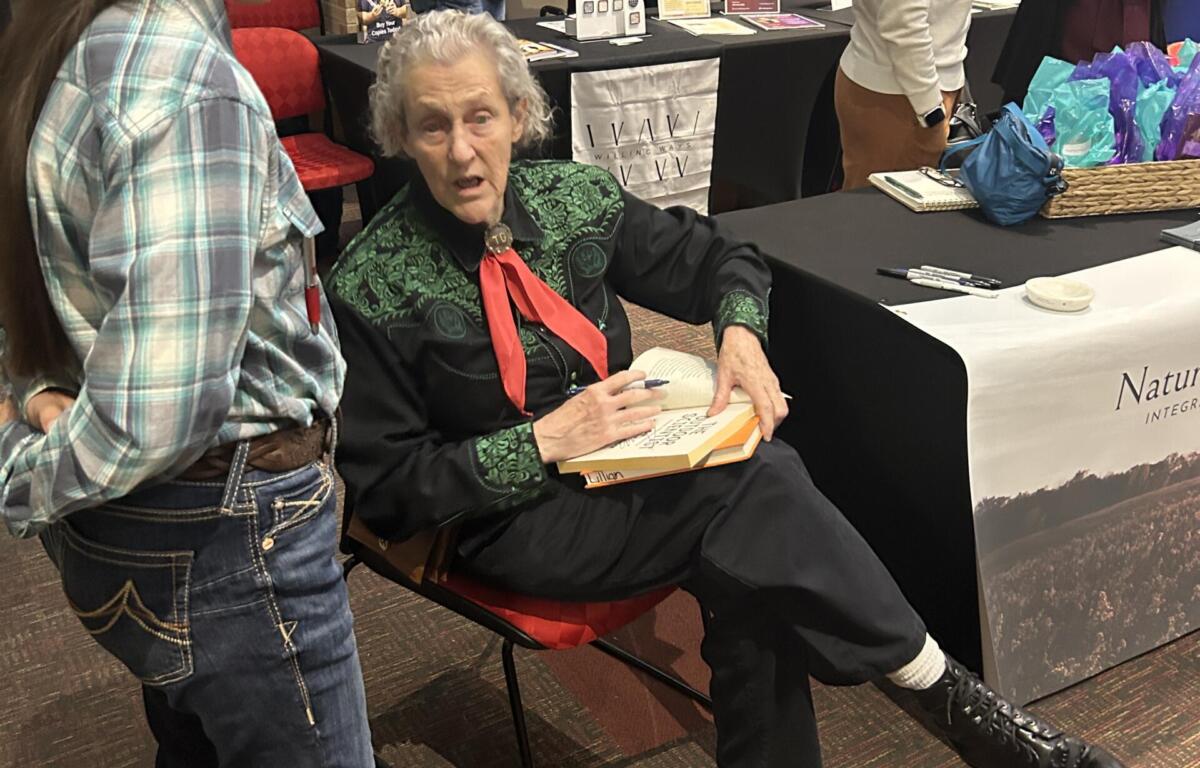Jonesboro, AR – (JonesboroRightNow.com) – Temple Grandin, the celebrated author-speaker and animal-science visionary who has been called “the most famous person with autism,” visited the campus of Arkansas State University Thursday and addressed an evening gathering in the Carl R. Reng Student Union Auditorium. Hosted by local autism-advocacy leaders, the event drew a broad audience of educators, clinicians, parents, students, and community members—honoring Grandin’s unique blend of personal insight, professional achievement, and passionate advocacy.
The day opened with a conference for the A-State College of Agriculture. “The Importance of Good Stockmanship” centered on neurodiversity, autism, and educational innovation. Over 300 college ag students and high school vocational ag (FFA) students attended. The conference was spearheaded by Dayna Miller-Black of Arkansas Autism & Behavior Solutions, Inc., whose personal journey as a behavioral analyst and mother of autistic son Briar gave the day a deeply grounded and local-relevant tone. In this setting, Grandin joined a series of sessions exploring how to better support autistic youth and tap into their strengths—not just remediate deficits.
Grandin’s keynote in the afternoon introduced her much-discussed concept of “object visual” thinkers: individuals whose internal processing is built on rich, picture-based imagery, mechanical intuition, and hands-on problem-solving, rather than the purely verbal or abstract reasoning path so common in traditional schooling. She emphasized that many of these thinkers—often diagnosed on the autism spectrum—are relegated to quiet, solitary pursuits (“sitting in their basement playing video games,” she observed) when in fact their talents might be harnessed instead to fix things, to design, build, repair, innovate.
She challenged the “one-size-fits-all” curriculum model: schools and systems still default to a path sized for verbal-linguistic learners, she said, when in fact students “are not all the same.” She urged a shift in emphasis: animal science first, autism second—a formulation underscoring that her professional identity is rooted in animal science (not solely in her diagnosis) and implying that the same should hold for others: pursue a passion first, let therapy or diagnosis take its rightful place.
Thursday night at the ASU Student Union Auditorium, the crowd gathered to hear Grandin speak more fully on her latest book Visual Thinking: The Hidden Gifts of People Who Think in Pictures, Patterns, and Abstractions, released in 2023.
She opened with her now-familiar line: “We need the skills of people who think differently.” That phrase summed up the evening’s theme: honoring neurodiversity not as a burden, but as a distinct asset.
Grandin described her own style of thinking in vivid terms: “I translate spoken and written words into full-color movies that run in my head.”
She noted that this “object-visual” mode of thought is particularly strong in mechanical talent: being able to “see” how a machine works, or how parts fit together, almost like an internal 3-D simulation. She lamented that many such thinkers are under-utilized in our society, and asked rhetorically: “Why are they playing video games in their basement, when they could be designing the next machine, fixing the next rig, doing the next big build?”
She emphasized that the education system tends to screen out these thinkers – standardized testing, heavy reliance on abstract algebra or foreign language, elimination of shop class and hands-on options – and thus we lose not only individual potential but broader innovation. Grandin said schools have cut back on hands-on learning, “the courses visual thinkers need.”
She called on educators, therapists, parents and students alike to rethink how we identify and nurture strength-based paths: for kids on the spectrum, she said therapy should be tailored, and early intervention should look toward what they can build, what they can design, what they can fix – and yes, animal science remains one of the best pathways she cited, explaining how it was hers.
After her address, Grandin signed copies of her book The Way I See It: A Personal Look at Autism and other works for attendees. The signing line stretched, underscoring the local community’s level of interest and respect for her message and presence.
The presence of Dayna Miller-Black and her son Briar as the opening speaker gave the event a powerful Arkansas-specific touch: Briar’s own voice—autistic, committed, real—helped bridge the academic/professional insights of Grandin with the lived experience of local families. Bringing Grandin to Jonesboro through Miller’s efforts helped ground the national-scale reputation of Grandin into the local community, making what otherwise might feel distant feel very real and actionable for educators, families and young people in Northeast Arkansas.


